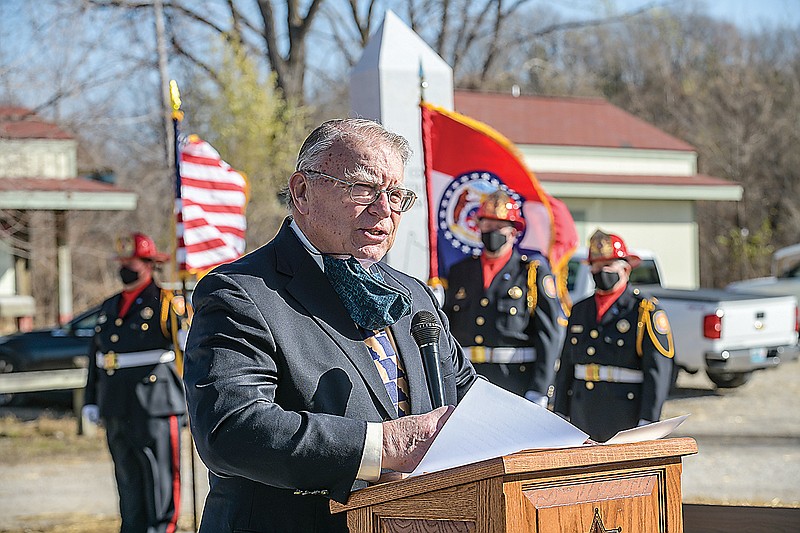Officials from Cole, Boone and Callaway counties dedicated a new marker at the Katy Trail in North Jefferson City to commemorate the 200th anniversary of all three counties Monday.
Monday's ceremony also marked the kickoff of next-year's bicentennial celebration for Missouri, which became at state in 1821.
Monday marked the actual anniversary of the day Cole and Boone counties came into creation, followed by Callaway County nine days later, Cole County Bicentennial Committee Chair Marc Ellinger said.
"It's an amazing component of our history as a people and as a state, how these three counties have had so much influence on the long-term growth and development of our state," Ellinger said.
Ellinger thanked Central Bank, which agreed to underwrite the cost for the memorial. Similar to the one placed on the grounds of the Cole County Courthouse earlier this month, it has three sides with the names of the counties written on each side, facing the county they are named for.
Missouri Department of Natural Resources Director Carol Comer told the crowd the monument will be seen by many people because of the popularity of the Katy Trail.
"The trail's impact isn't just recreation; it has an economic impact of $18 million annually," Comer said. "This year, from April through October, total trail visitation was up almost 95 percent over last year. Clearly Missourians relied on the trail to provide recreation and entertainment during this pandemic crisis."
Historian Bob Priddy told the crowd that at the time the pioneers first settled here, "we were a country that spread to just about here and not much further. They laid the groundwork for the country that now goes from one ocean to the other. They were the crossroads of the nation. The west flowed through these three counties."
"This is an area of farmers, once the home of shoe factories and mines and places where cities were planted by hopeful people," Priddy continued. "Some of those hopes weren't realized because those cities never materialized, but for many people, those places did become prideful places to live. The fact is, we live their legacy, and we remind ourselves to cherish the things they have given us."
Cole County Presiding Commissioner Sam Bushman noted the first appointed position the Legislature made after creating Cole County, was that of sheriff. Paul Whitley was named to the post.
Story continues below video
"Then they appointed the first three county judges (now known as commissioners), John Vivion, James Stark and Jason Harrison," Bushman said. "The first building the county built was a jail, which was a 14-foot-by-14-foot log cabin for a cost of $690.
"Our population was only 1,028 in 1820. When the county judges moved the county seat from Marion to Jefferson City in 1829, again, the first county building to be built was the jail, near the First Methodist Church, at a cost of $900. To give some perspective, the current county jail, built in 2011, cost the county $28 million."
Bushman, along with Boone County Presiding Commissioner Daniel Atwill and Callaway County Presiding Commissioner Gary Jungermann, presented Gov. Mike Parson with a 24-star United States flag as a symbol to mark the beginning of the state's bicentennial celebration. Missouri was the 24th state to join the union.
Parson said he has learned to appreciate the history of the state more during his time as governor.
"Living in the mansion, you see the pictures and read the stories and you think how important it is to preserve that over the years," Parson said. "Today we're here as individuals and we probably don't think too much of it, but a year from now, somebody will talk about that monument when they bring their family out here. Then 100 years from now and 200 years from now, they'll talk about us and why they built the monument in the first place."
Priddy reminded the crowd the bicentennial was not only a time to think about ourselves and celebrate but also to think about those who would celebrate the tricentennial and what kind of place they will come from and what kind of people they will be.
"We are 21st century citizens who are the heritage of those who arrived with hope and calloused hands who carved the pathways and built the settlements that have brought us counties and our state," Priddy said. "This event gives us some choices to make. Will we continue to follow the trails they established through extraordinary efforts, or will we follow new trails of fiction and fear too easily established these days and too easy to follow?"
"What kind of people and what kind of country, state and nation do we want to have gathered here 100 years from now around this then-aging monument?" Priddy asked the crowd. "Our generations will take the first steps on that new trail that stretches before us, the steps that will determine what kind of people and nation will be here. So let our celebration of the past be brief and let our steps today be steps that those who celebrate our tricentennial will be as grateful for us taking, as we are for the steps taken by those who were here first, 200 years ago."

